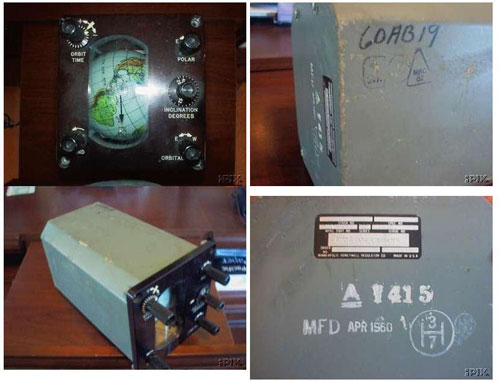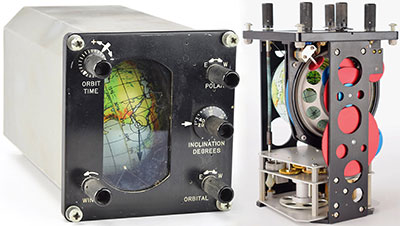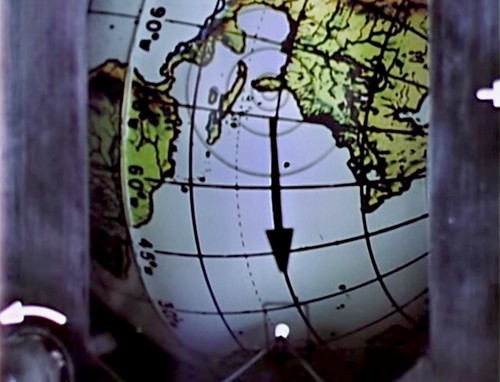|
|

|
|
Author
|
Topic: Mercury instrument panel artifacts
|
SpaceAholic
Member Posts: 5241
From: Sierra Vista, Arizona
Registered: Nov 1999
|
 posted 10-22-2007 11:35 AM
posted 10-22-2007 11:35 AM
   
Anybody on forum aware of a Mercury instrument panel sub-assembly ever previously coming to market or existing in private collection? |
Robert Pearlman
Editor Posts: 50384
From: Houston, TX
Registered: Nov 1999
|
 posted 10-22-2007 11:48 AM
posted 10-22-2007 11:48 AM
   
I vaguely remember seeing at least one piece of Liberty Bell 7's instrument panel being among the large acrylics issued by the Cosmosphere, but I could also be misremembering what I saw. |
music_space
Member Posts: 1193
From: Canada
Registered: Jul 2001
|
 posted 10-24-2007 01:53 PM
posted 10-24-2007 01:53 PM
   
There was an item in April 2002 on eBay, a test article orbit indicator, erroneously identified by the seller as you'll read further. There was a Buy It Now of $2000, I came to eBay just as it had been posted, and while I feverishly researched the item (including a short exchange with Rob Pearlman), when I got back, some well-wisher had put some low-bid, disabling the Buy It Now.You'll see that it is pretty identical to the one showed, with visible mechanism, in the exhibition "In Search of Liberty Bell 7." You'll see that the auction went through, and I missed. My biggest miss so far (and I had in my US funds account $2200 US, which is worth about $1400 Canadian now with the high Canadian dollar). From eBay: Serious bidders only please! I acquired this item through NASA officials a number of years ago. I was told it came out of the Apollo 15 command module but I have no real evidence it did. My source was very legitimate, however. Someone with more time could probably trace serial numbers to the exact module. It is an Earth Path Indicator, also called an Earth Orbit Indicator. I have seen an earlier model that looks a lot like it that came out of Gus Grissom's retrieved Liberty Bell spacecraft. It's purpose was to provide the astronauts a manual, non-electronic method of pinpointing their splashdown and window of reentry into the Earth's atmosphere. This item was manufactured by The Minneapolis Honeywell Regulator Company in April of 1960. It bears stock #DJG280A1, Series A5, and Serial # J-12. See the pictures for the markings. Everything works. It is a wind-up mechanism. When wound the earth turns inside the box once every 90 minutes. Orbit time can be slowed or sped up. Inclination can be set between 20 and 40 degrees. Here's the bidding tally: - dslater@ix.netcom.com $4,717.00
- spacesource $4,667.00
- ken@winansintl.com $2,611.99
- music_space $2,600.00
- ken@winansintl.com $2,511.99
- darcfyre $2,500.00
- ken@winansintl.com $1,269.99
- kgschwartz@aol.com $1,195.00
- darcfyre $1,060.00
- lfordiv $1,010.00
- fkitslaar@aol.com $655.00
- jg992780@aol.com $610.00
- astronut $525.55
- ftiscoop $500.00
- grotbc $435.00
- madelman2001 $425.00
- lunartexan $410.00
- bjwest $400.00
- ftiscoop $350.00
- music_space $325.00
- ftiscoop $320.00
- kgschwartz@aol.com $310.00
- fkitslaar@aol.com $300.00
 That was before I knew you hardcore hardware collectors: so what do you think after all? |
R.Glueck
Member Posts: 115
From: Winterport, Maine, USA
Registered: Jul 2004
|
 posted 10-24-2007 07:41 PM
posted 10-24-2007 07:41 PM
   
That may be one of the coolest objects to identify with early American spacecraft. I wonder if these were built in assembly line style (so that many copies could be made) or in piecemeal fashion. It was still possible to locate Soviet era clocks from Soyuz vehicles, if you knew the right resource in Moscow, around ten years back.As far as I am aware, the only pieces of "Liberty Bell 7" sold were a few corroded and replaced rivets, and some fragments on flight movie film. I doubt other pieces could be sold, since they comprise important historical fabric of the lost and found space capsule. |
SpaceAholic
Member Posts: 5241
From: Sierra Vista, Arizona
Registered: Nov 1999
|
 posted 10-24-2007 08:35 PM
posted 10-24-2007 08:35 PM
   
Yep, beautiful; am sure there are a number of us, including yours truly, who regret being asleep at the switch during that auction. Thanks for archiving and posting the details François — you beat the "Wayback Machine" hands-down! |
Lou Chinal
Member Posts: 1387
From: Staten Island, NY
Registered: Jun 2007
|
 posted 10-26-2007 03:52 PM
posted 10-26-2007 03:52 PM
   
This was a "find." The EPI or Earth Path Indicator was part of the Mercury instruments. However I only know of two being flown. Spacecraft #11 and Spacecraft #13. Shepard's didn't have one. Grissom had one, but it was not hooked-up. Glenn's #13 was the only one that was operative. Carpenter's #18 had a small opening where film was kept. |
Jurvetson
Member Posts: 162
From: Los Altos an SF, CA, United States
Registered: Sep 2011
|
 posted 04-29-2023 05:06 PM
posted 04-29-2023 05:06 PM
   
Well, I just bought one (full blog post here), and gosh, I did not get nearly as good a price.   Lou - I would love any pointers you might have to it not flying with Carpenter. A National Air and Space Museum page claims "This instrument was launched in 1961 on an unmanned test flight. John Glenn and Scott Carpenter, the first Americans to orbit the Earth, carried identical devices on their flights in 1962." But they don't cite their sources, and the Mercury Familiarization Manual says "Capsules 16 and 18 will not have the Earth Path indicator installed." In any case, I am doing my research on this artifact and would love to know of any source for the part numbers for the Earth Path Indicators (EPI) that flew on MA-6 and possibly MA-7 and MR-4. Were any assigned to later missions, and subsequently removed before flight, as I have been told happened with MA-8? The MA-6 EPI remains in the capsule at the National Air and Sace Museum, and the capsules from MA-7 and MR-4 have an empty space where the EPI would reside. |
Jurvetson
Member Posts: 162
From: Los Altos an SF, CA, United States
Registered: Sep 2011
|
 posted 04-30-2023 02:26 PM
posted 04-30-2023 02:26 PM
   
More fun finds... Adam Savage built a MA-6 replica, highlighting the EPI: "This is maybe my favorite instrument of any cockpit ever!" from his video overview. And there is an interesting use of the EPI in the 1962 NASA documentary of John Glenn's MA-6 flight: they used a unit on the ground to provide video annotating the orbital path at the time. Because the EPI is essentially a wind-up analog computer that shows the orbital position, just based on original launch parameters (inclination and orbit time (derived from altitude)) and no input from the spacecraft, an EPI on the ground can be in sync with the unit in orbit. They introduce it here  ...and revisit several times, such as minute 32:38 "with a beautiful view of the African coast" and a series starting at 39:07 when MA-6 suffered a left yaw thruster problem in the automatic control system, and Glenn did a manual takeover. | |
Contact Us | The Source for Space History & Artifacts
Copyright 2023 collectSPACE.com All rights reserved.

Ultimate Bulletin Board 5.47a
|
|

|
 advertisement advertisement

|
















